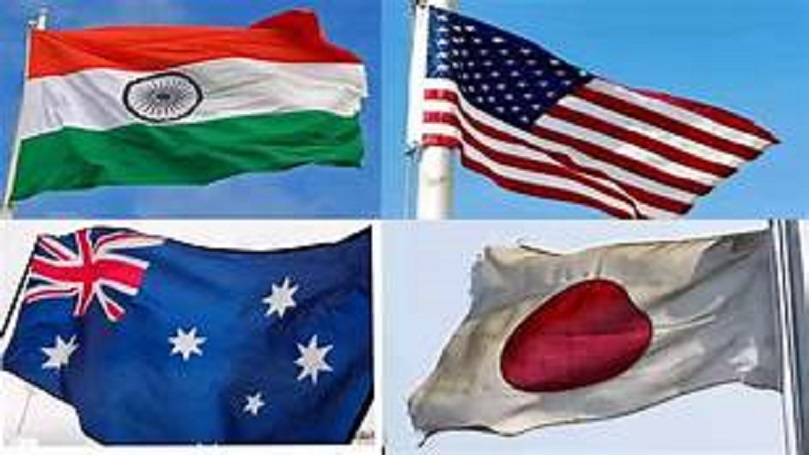Good news is coming from the Quad front. Reports suggest that the heads of state/government of the four countries that comprise the informal security forum will soon meet virtually—possibly this month itself. This will be the first meeting on the Quad platform of the Prime Ministers of India, Japan, Australia and the President of the United States, the four countries that comprise the Quad. It is hoped that this will pave the way for the metamorphosis of the Quad into a formal security alliance, from an informal chatroom, which it is right now. Of course, the Quad has come a long way from 2007, when the then Japanese Prime Minister, Shinzo Abe first mooted the idea. But Quad 1.0 was a non-starter, with the then Australian Prime Minister Kevin Rudd withdrawing from the forum. It was almost a decade later in 2017 that the idea was revived under the leadership of Indian Prime Minister Narendra Modi, and the then Japanese Prime Minister Shinzo Abe, Australian Prime Minister Malcolm Turnbull and US President Donald Trump. Ever since, naval exercises have become the hallmark of the Quad, even though it was only last year that India invited Australia to be a part of the Malabar exercises, thus bringing all the four countries together for the first time for a military exercise. A meeting of the foreign ministers of the Quad countries took place in Tokyo in October 2020, however the statements from the Indians, Japanese and Australians were so anodyne—with India even refusing to use the term Quad in its statement—that observers were left wondering which way this grouping was headed. In fact it was only the then US Secretary of State, Mike Pompeo who was categorical about the need to institutionalise the Quad into a security framework, while the others restricted themselves to pledging to make the Indo-Pacific free and open and build resilient supply chains—euphemism for shifting manufacturing out of China.
It is in this context that the planned video meeting of the leaders of the four countries—Narendra Modi of India, Yoshihide Suga of Japan, Scott Morrison of Australia and Joe Biden of the US—has to be seen. For such a meeting could be one of the first building blocks of forming a “Nato-like” security alliance for the Indo-Pacific, with the specific aim of countering an authoritarian China. An Indo-Pacific charter needs to be drawn up, with its fundamental premise being “an attack against one ally is an attack against all”, something which is the “fundamental goal” of the Nato alliance as well. Nato was meant to counter the Soviet Union. In the 21st century, the “enemy” has changed. But then this enemy, China, is far more dangerous, malicious and powerful than the Soviets ever were. Worse, having learnt from the mistakes that the Soviets made, it seems near invincible, as it goes around trying to fulfil its imperialistic designs, turning countries into vassal states and remaking the world with Chinese communist characteristics. As this newspaper has been writing week after week, China is already at war with the world—it is conducting an “unrestricted warfare”, a political war, if not kinetic combat. If the battlefield is everywhere, according to the Chinese, then all means—fair and foul, mostly foul—are justified towards the end of world domination. But sooner or later there will be kinetic combat and it could be on any front. Hence the need to expedite the formalisation of the Quad. To start with, an operational headquarters for the Quad must be identified and this could be in India’s Andaman and Nicobar Islands. These islands are strategically located at the mouth of the Malacca Strait and thus are in the middle of some of the world’s busiest sea lanes for trade and energy. The islands already have a base for the Indian Navy, and thus have the potential to develop into a military base for the Quad. It can also be a good “listening/monitoring post” to detect all movements of Chinese vessels in the neighbourhood for this is the route that the Chinese will have to take to reach the Indian Ocean. But the operational details can be taken care of provided there is willingness to step up the effort to draw up an Indo-Pacific charter. There is a school of thought that says that a security alliance is not possible in the Indo-Pacific because of the close trade relations that all the Quad and the Quad Plus countries have with China. This is a valid point and the reason why Quad needs to be an economic alliance as well. It needs to develop as a trade bloc, which is an alternative to the RCEP in particular, with the two countries that are out of that China-led trade alliance—India and US—taking the initiative to build it. One of the starting points for this could be the “Supply Chain Resilience Initiative” (SCRI) proposed by Japan at the Tokyo meeting. When it comes to China, time is not the rest of the world’s best friend, hence an Indo-Pacific charter is the immediate need of the hour.
An Indo-Pacific charter needed
- Advertisement -

